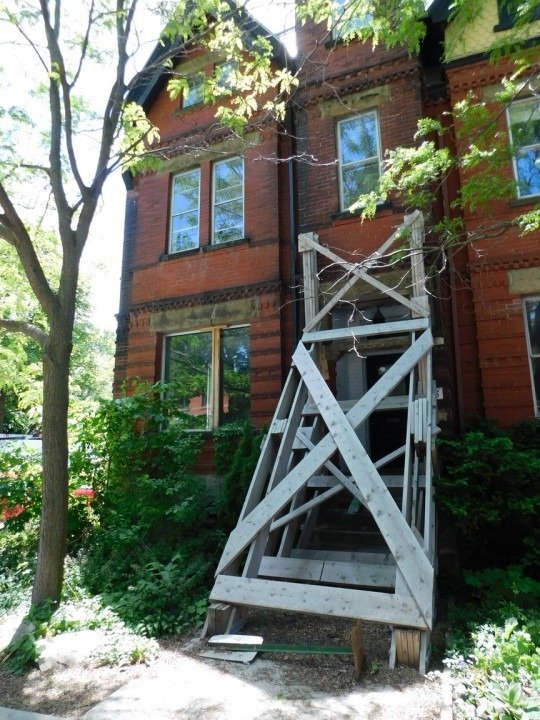Preventing unnecessary demolition –Enforce responsibilities of property ownership

Promoters and developers are using a procedure of buying properties for the sole purpose of holding onto them over a period of time and letting them deteriorate through non-maintenance so that municipalities would then be more likely to allow demolition to take place. That is the antithesis of good urban planning, and it is a loophole that municipalities need to correct as soon as possible.
The above pictured property has been unoccupied for a few years. Whenever a property remains vacant for any length of time, it tends to deteriorate quite rapidly. A broken water entry occurred in winter after it was first sold and the purchasers were still deciding if they could afford to renovate. Now that constitutes a lack of planning. It was subsequently resold even after the protective ramparts went up which you can see in the photo. One has to assume that the new owner thought they could renovate the property but it only continued to deteriorate much to the consternation of the adjacent property owners. It is the end unit in a row house. Not a good situation to be in. Property values will be affected.
The City should be preventing [should have prevented] this from happening. Municipal bylaws have to be passed outlining the obligations of property owners to maintain a property, perhaps even requiring occupancy. Normal maintenance means spending about 5% of the value of the property each year [it can vary from year to year] so as to take into account changes in the municipal building code [i.e.upgrade for reasons of health and safety] and to change obsolete and deteriorated building components as needed. However, there is a tradition of laissez faire regarding property ownership and we are living through an era of deregulation.
Urban planning came into effect in Canadian municipalities quite late, early 70’s in some cases. The objective of urban planning was to allow municipalities to plan their evolution and to preserve property values. The concept of zoning was intended to prevent one property owner from causing adjacent properties to decrease in value [such as the above example]. The Quebec Civil Code has lots of clauses regarding the responsibilities of property ownership. We have urban planning bylaws. The National Building Code of Canada is upgraded every 5 years to set out minimum standards [now referred to as objectives] for health and safety. But all those regulations are only as good as the extent to which municipalities adopt and implement them. We are living through an era of deregulation where individuals seem to cherish their freedoms and privileges more than anything else. So much of my writing is about the need for stiff regulations to fight global warming and climate change. Most homeowners still don’t get it. They have to be part of the solution. Many believe that there is a freedom to pollute– based on the type of response I get when I promote regulations such as the need to ban wood burning fireplaces [which Westmount still hasn’t done].
#demolitionissue #houseflippers #realestatespeculation #architecture #urbandesign #health/safety #zoning
